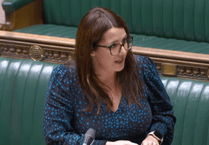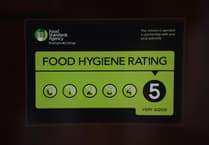Crickhowell-based community benefit society Our Food 1200 is off to a flying start in its search for 1200 acres of land for local small-scale regenerative horticulture.
The organisation, which launched its hunt for land and growers last Wednesday March 30, has already had 19 offers from farmers and landowners across Monmouthshire and the Brecon Beacons.
Joint project manager Duncan Fisher said the offers range from just under an acre, to one parcel of around 35 acres:
“We’ve been overwhelmed by the response – and we’ve also had enquiries from people looking to start regenerative horticulture in this region as well as from existing growers who want to join our network.
“The key thing is that all of these people – farmers, landowners and growers – share our ambition to build a vibrant local food economy and help tackle the climate emergency through humble fruit and veg.”
75 people attended last week’s launch event on Zoom, including representatives from Public Health Wales, Monmouthshire County Council, Powys County Council, Brecon Beacons National Park Authority, Tyfu Cymru, Black Mountains College, and the National Trust.
Speakers included Crickhowell councillor John Morris, an organic beef farmer and apple juice producer who took the plunge two years ago to lease one of his fields to local regenerative growers Katherine and David Langton. Their business, Langtons Farm, is now a thriving concern, supplying weekly veg boxes to 80 local households and selling seasonal organic produce at their Saturday market stall.
Speaking about his experience, John Morris said: “It’s not a new concept: farmers have always rented out their land. But renting land for horticulture is a bigger commitment because of the infrastructure change that’s required with polytunnels and so on.
“So it’s vital that you put things on a business footing from the start, and that you’re honest with each other, because it is a bit of a leap of faith. And it requires a good understanding between the landowner and the tenant.
“It’s also important to have an exit plan, because you’re not doing grass keep for six or 12 months: you’re committing your land for at least two years and preferably five.”
Stewart Waters, managing director of property agency DJ&P Newland Rennie’s land sales team, touched on other aspects, including tenancy agreements, and planning and tax implications for farmers considering offering land.
He said the project appealed to him, saying: “
Mr Waters added: “I can see that a young and enthusiastic grower could bring a completely different dynamic to a farmer’s life. And of course it’s providing what is these days a very scarce opportunity for young farmers and new entrants to get a start.”
Meanwhile, Catherine Mealing-Jones, chief executive Officer of Brecon Beacons National Park Authority, spoke about the key role regenerative farming and horticulture would play in shaping the Park’s future:
“But unless that’s supported by the policy sphere, to make that big shift from extractive to regenerative farming, attempts to change things will remain niche – and that’s not where we want them.”
She also acknowledged that part of the landscape change that needs to happen is the ability for people to live much closer to the land they are tending.
Ms Mealing-Jones added: “I’m not convinced that the planning policies as they stand today really enable that.
“We’ve got huge potential in this area and in surrounding communities to feed ourselves and others with the best-quality, local seasonal produce. But we’ve got to start doing something quite fundamentally different.
“We are expected to offer the Brecon Beacons National Park as a test bed for the thinking that will shape future policy. And I really believe that if we work together, we can make the changes that we want to see.”
Summing up the event, Duncan Fisher said: “It’s all been incredibly positive; we couldn’t have asked for a better response.
“Over the coming weeks, our experts will be visiting all the people who have offered land for an initial assessment to gauge suitability. We’ll then produce a one-page profile for each piece of land, post it on our website, and promote it to growers looking for land.
“It’s an amazing start to a project that has the potential to transform our region for the better in so many ways.”
To register for project updates and for more information, including how to get in touch, visit www.ourfood1200.wales or join the Our Food 1200 Facebook group.




